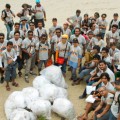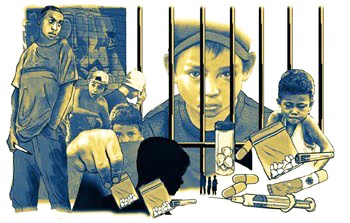Stories about Youth from October, 2012
Swaziland: The Princess show-stopper ‘virginity dance’
Welcome DLAMINI writes about ‘virginity dance’ in a post published on swazilive.com: Her Royal Highness Princess Sikhanyiso performed her show-stopper ‘virginity dance’ under floodlights yesterday as the 2012 Reed Dance Ceremony progressed into the twilight
Colombia: The Conflicting Relationship With ‘The Public’
After riots at the campus of the National University of Colombia in Bogotá last week, some students proposed [es] to paint the buildings white to express their rejection of vandalism, prompting a debate [es] about the issue. Andrés Villaveces writes [es] about this and the “conflicting relationship” of most Bogotanos...
Kenya: Money Can Buy Us Declare ‘Campus Divas for Rich Men’
‘Campus Divas For Rich Men’ is a Facebook page dedicated to hooking up female Kenyan university students under the age of 26 with rich men of any age. This bold move in a predominantly conservative society has prompted significant online public debate.
China: Student Throws Shoe to Defend Free Speech
A student from Hainan University threw his shoe recently at Maoist commentator, Sima Nan, to protest against the absence of free speech in China. Watch the video of the incident and read the reactions.
Bangladesh: Cleaning Up the Beach
More than 300 Volunteers took part in this year's International Coastal Cleanup event in Bangladesh – reports Fahim Alam Khan at Kewkradong Bangladesh blog.
Dominican Republic: Proposal to Toughen Sentences for Minors
The House of Representatives has approved a controversial bill to increase the maximum sentences for minors who commit crimes. Although some support the measure, believing it will decrease the delinquency rate, various sectors of civil society insist that this is not the answer to the current wave of delinquency in the Dominican Republic.
Spain: Ryanair (aka Adventures in Flying)
Ryanair, the low-cost, no-luxury Irish airline is coming under fire once again. This time for the various incidents that have occurred in Spain and other countries in the last few weeks. The issue has not left netizens indifferent.
Tajikistan: Costly Conscription
Blogger Teocrat writes [ru] that the conscription of young men into the military in Tajikistan puts a heavy financial burden on the conscripts’ families and the state. He also suggests that the better educated and more religious conscripts reduce the incidence of bullying in the army.
Brazil: Sany Kalapalo – Young, Indigenous and a Xingu Activist
Sany Kalapalo, a young indigenous from the Xingu region, is only 22 years old and is one of the more active voices against the construction of Belo Monte hydroelectric powerplant, in the Xingu river, in the Brazilian state of Pará. Meet her in the first part of this interview she gave to Global Voices Online.
Hong Kong: National Education Scrapped but Tensions Continue
The Hong Kong government's controversial plan to introduce a moral and national education curriculum (hereafter national education) in elementary schools has finally been scrapped after rigorous citizen protests - including hunger strikes.
South Korean Voters Call for Longer Poll Hours
With less than three months left until the presidential election, young South Korean voters are calling for longer poll hours, clashing with the ruling conservative party. The South Korean poll generally ends at 6pm and lots of young workers, working from 9 to 6 and working under strict corporate culture, have trouble going to the poll. It is worse for six million contract workers whose employment status is always unstable.
Burkina Faso: Architect Innovates with Sustainable Primary School
Architect Diébédo Francis Kéré has designed a sustainable primary school in Gando, Burkina Faso, using mud bricks and corrugated iron. The innovative design allows much needed light and ventilation in a village where temperatures sometimes reach 104° F.








